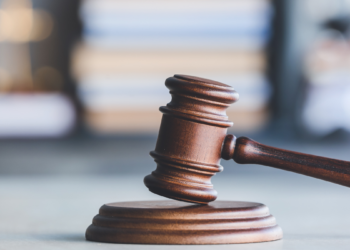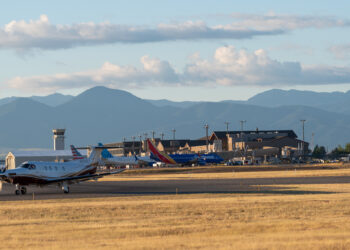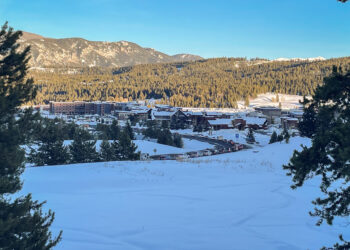Organizers of last year’s event celebrate second parade, status as a new nonprofit
By Jen Clancey DIGITAL PRODUCER
In a line of hats, shiny belt buckles and rainbow fans, Big Sky carried out its second-ever Pride march. Big Sky OUT, an organization and newly-established nonprofit for queer inclusion and community-building in Big Sky, led the event. Donning neon vests, BSO members and volunteers kept participants on the route, yielding to occasional traffic as they marched along the sidewalks of Big Sky Town Center.
Just after the march, BSO Founder Brit Diersch reflected on the growth of Pride events with Explore Big Sky as music played in Len Hill Park on Saturday afternoon.
“It’s really beautiful to see because we were just an ambitious little group of friends that just wanted to have a little march and when so many people showed out [in 2023] it sparked so much passion for me personally,” Diersch said. What was a march with speeches and poster-making last year developed into a full roster of Pride Week activities in Big Sky for 2024.
“To have an entire weekend full of Pride events—it’s just incredible to see so many faces I recognize in the crowd and to see so many locals come out to support,” Diersch said.
After activities throughout the week, BSO kicked off the weekend on Friday with a Queer Variety Show at the Warren Miller Performing Arts Center showcasing local queer talent.
“That was some of the biggest queer joy I have ever experienced,” Diersch said of the show—the first of its kind in Big Sky—recalling that she and many other attendees cried tears of joy while supporting performers. “I have never seen that much queer community in Big Sky in one place.”
By 1:30 p.m. the next day, preparation for the Big Sky Pride March began with poster-making and face painting in Len Hill Park. At 3 p.m., the march began. To the beat of a drum, attendees marched past BASE, made a right at the end of Simkins Road and walked their way through Town Center.

Volunteers from the Be Well Big Sky Navigator Network were among the safety crew members who guided the line, ready to step in for any first-aid needs and trained in de-escalation if conflicts occurred. Be Well Big Sky Navigators are trained persons that connect individuals with mental health resources, and encourage open discussion of mental wellness in the community.
Shannon Steele, director of Be Well Big Sky, said that her team was available to anyone seeking mental health resources or needs during the day. She was excited to celebrate community, echoing her Navigators’ hope for unity and diversity in Big Sky.
Safety crew members and attendees continued down Town Center past Beehive Basin Brewery and under the arch of Big Sky Medical Center. From there, marchers strolled along Montana Highway 64 (Lone Mountain Trail), with some passersby beeping and waving from their vehicles.




Paraders took a left turn at Ousel Falls Road and headed to Len Hill Park, where a drummer set a beat until the last person arrived. As attendees grabbed refreshments and took a seat on the grass in the park, transgender Democratic Representative for Montana House District 100, Zooey Zephyr, took to the stage.
“I am so excited about how Montana has shifted in the last five years from having one centralized pride that kind of bounced around from city to city, to prides everywhere,” Zephyr said to the crowd during her speech.
Throughout the summer, Zephyr has attended pride events across the state, including Bozeman’s Pride Stroll on June 1, the first day of Pride month. Earlier on the morning of June 29, Zephyr was in Anaconda’s Pride Fest—two hours of driving later, Zephyr arrived in Big Sky with her fiancé, Erin Reed, a transgender journalist who compiles “Erin in the Morning,” a newsletter that informs readers of queer and trans legislation.
As the queer community in the U.S. faces legislation and opposition, Zephyr asserted that small town prides are “anchor points.”
Montana’s legal history of queer rights is recent. Same sex sexual activity only became legal in Montana after a 1997 Montana Supreme Court case, Gryczan v. Montana, determined that criminalizing same sex sexual interactions was in violation of a person’s right to privacy in the Montana Constitution. Montanans secured the right to same-sex marriage 10 years ago.
In late April 2023, Zephyr spoke in opposition of legislation that would restrict gender-affirming care for transgender youth, known as Senate Bill 99. Montana Free Press reported that Zephyr was censured following her remarks, leading to protests in the Montana House gallery several days later.
Now in Len Hill Park, Zephyr eyed the crowd that showed up for BSP, and noted what it meant for the local queer community. “You see everything here from roller derby girls, to a trans mom and her daughter, a trans couple with our kid, 77-year-olds who have queer family members,” Zephyr said in an interview with Explore Big Sky. “There’s a dad of a trans daughter who cried in my arms here today.”
She reiterated a point she made in her speech: “Even if every queer person in Montana moved to an imaginary place where we could be fully and 100% accepted—queer people would be here again the next day, because queer people are not just in your communities, we are part of what it means to be a community,” Zephyr said.
In Anaconda, Libby and Big Sky, Zephyr has been inspired by the turnout for queer support at summer prides. She remembered a remark by colleague House Rep. SJ Howell, that Montana is big enough “for all of us.”
“That is sitting with me deeply in this moment here in a resort town up in some of the best skiing in the world, 30 minutes away from Yellowstone,” Zephyr said. “We are here and we are Montana too.”
Taylor McCaslin,a Big Sky OUT board member, described the legacy of Pride events in an email to EBS. “Pride is sustained by the unwavering commitment of activists and allies who courageously confront hatred and phobia, refusing to back down in the face of adversity,” McCaslin said. He continued, saying that people showing up for queer inclusion in a rural place like Big Sky shows the power of visibility.
McCaslin continued: “In essence, Pride is a testament to the resilience, love, and unity of the LGBTQ+ community and their allies, who continue to fight for equality, acceptance, and the right to live authentically and freely … [to] live authentically and freely, isn’t that what we all want?”
Following the march, local organizations and businesses set up tents for a Pride Fair, followed by a roller derby at 6 p.m. Diersch thanked supporters and sponsors for the event, including WMPAC, who allowed BSO to use the theater space, and businesses that expressed their support for queer inclusion through funds and their presence at activities. She hopes business participation will inspire other organizations to express their support, and she is already excited for next year’s Pride.
“I think we are small but mighty,” Diersch said, laughing at how “cheesy” the statement sounded, but noted its truth—from her BSO board members’ commitment to making Big Sky a welcoming place, to the locals who showed up.
“[There are] so many people willing to do so much good for our community.”














